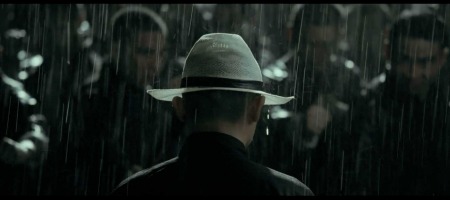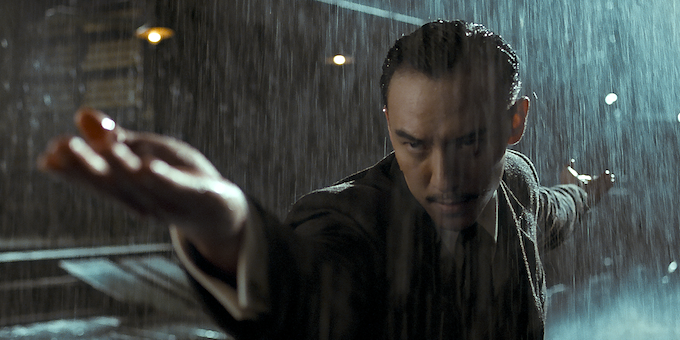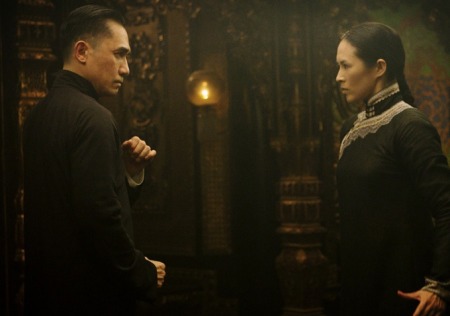Dancin' Dan here with my take on one of my most anticipated films of the year.

It's often easy to forget that the martial arts indeed are art, despite the fact that the word is right there in their given name. Practioners of kung fu, or karate, or judo hone their craft just as intensely (if not more so) as any painter, dancer, musician, actor, or filmmaker practices theirs. And to watch martial artists perform (that is, to fight) is quite often just as much of an awe-inspiring spectacle as it is to, say, watch Cate Blanchett navigate the course of Jasmine's unraveling. Wong Kar-Wai's The Grandmaster, far more than any martial arts movie in recent memory, understands this.
One might expect no less from a film directed by Kar-Wai, cinema's premiere sensualist. And on this point, at least, he doesn't disappoint. [more...]

He films The Grandmaster's many fight sequences (choreographed with typical ingenuity by Yuen Wo-Ping, who has served in the same function for seemingly every major martial arts filim of the '00s) with a heightened feel for the movement that mimics the heightened sensitivity of Ip Man (Tony Leung Chiu-Wai), the legendary master who trained Bruce Lee. Punches and kicks don't merely land here, they each hit with seismic, shattering force. You can even feel the energy radiating from the fighters before they move out of their fighting stance. The opening rain-soaked scene is immediately recognizable as the work of Kar-Wai (with Philippe Le Sourd serving as a more than able stand-in for his former cinematographer, Christopher Doyle), with slow-motion close-ups of rain spinning off a hat and splattering on the ground putting you right there with Ip Man as he fights solo against a gang of rivals. It's stunning, but far from the best fight sequence in the film. That honor would have to go to a later scene involving snow, a train, and the luminous Ziyi Zhang.
 Playing Gong Er, the daughter of a Grandmaster from the North of China who falls in love with Ip Man, Zhang is at her absolute best here. The early scrimmage between her and Ip Man is perfectly shot and edited, from the early, wary gauging of each other through the furious fast-as-lightning fighting to the surprising, triumphant end. There's even a great shot that captures the exact moment the two fall for each other, and it's as unexpected for them as it is for us. But it's in the later fight at the train station where Kar-Wai's vision really comes together, the one moment in the film where his statement that "action is another vehicle for expressing emotion." It's not just a moment, but an entire scene where we feel not just the blunt force trauma of the hits to the body, but the deep emotions surrounding the people involved.
Playing Gong Er, the daughter of a Grandmaster from the North of China who falls in love with Ip Man, Zhang is at her absolute best here. The early scrimmage between her and Ip Man is perfectly shot and edited, from the early, wary gauging of each other through the furious fast-as-lightning fighting to the surprising, triumphant end. There's even a great shot that captures the exact moment the two fall for each other, and it's as unexpected for them as it is for us. But it's in the later fight at the train station where Kar-Wai's vision really comes together, the one moment in the film where his statement that "action is another vehicle for expressing emotion." It's not just a moment, but an entire scene where we feel not just the blunt force trauma of the hits to the body, but the deep emotions surrounding the people involved.
If I haven't spoken a lot about the actual plot of this version of The Grandmaster (the version being shown in American cinemas is a completely different, shorter cut than what was premiered at the Berlinale in February, which in turn was a different cut than was released in China), it's because for a film with this much plot, it doesn't seem to really care about it. Most of the plot is presented via title cards explaining exactly what is happening at this moment in history to give context to the scenes about to follow. This is incredibly important, especially for those of us not well-versed in Chinese history or the life of Ip Man, but it's also lazy, and well beneath a director of Kar-Wai's talents.
It also doesn't help that most of this version is focused on the love story between Ip Man and Gong Er. Resting a film on the shoulders of two of the most beautiful actors in the world isn't a crime, but the love between them, as presented, is far too thin to stretch across an entire film. Leung and Zhang sell it (a late scene between the two is nearly as heartbreaking as anything in Kar-Wai's masterpiece In The Mood for Love), and Kar-Wai uses their gorgeous faces and expressive bodies in the best possible way, but if you're going to rest an historical epic on a romance, then that romance needs to be big. It doesn't have to be epically huge, but it needs to feel larger than the characters in order to carry the film. This simply doesn't feel like a relationship that had a significant impact on either character, even if it clearly meant a lot to them.
But the cinema of Wong Kar-Wai is a sensual one, focused on making everything tactile, and on that score, this might be his most successful film yet. There's a scene with Gong Er practicing her father's art in the snow, in which Kar-Wai makes you feel every snowflake she brushes it around with her light feet, every ripple in the breeze created by the movement of her arms, and the soft, luxurious warmth of her fur hat (seriously, fur has never looked this luscious on film). And the final image of Zhang in the film is one of the most beautiful, haunting things Kar-Wai has ever put onscreen.

If the American cut of The Grandmaster doesn't completely satisfy, then, it isn't for lack of beauty, but rather lack of purpose and focus. The film purports to be about Ip Man and his journey to become a world renowned Grandmaster of his art, but it only really comes alive when it focuses on the story and journey of Gong Er. The film chooses to centralize the love story between its male and female leads, despite the fact that none of the emotional punches hit as hard as the physical ones do. I don't know how the American cut differs from the Berlinale or Hong Kong cuts, but I get the feeling that this isn't the best possible version of The Grandmaster. It's as easy to get lost in the gorgeous, tactile imagery Kar-Wai puts on display as it is to get lost looking in the eyes of Tony Leung and Ziyi Zhang (and neither has ever looked more beautiful than they do here), but the film that contains them sadly adds up to less than the sum of its parts.
GRADE: B(-?)